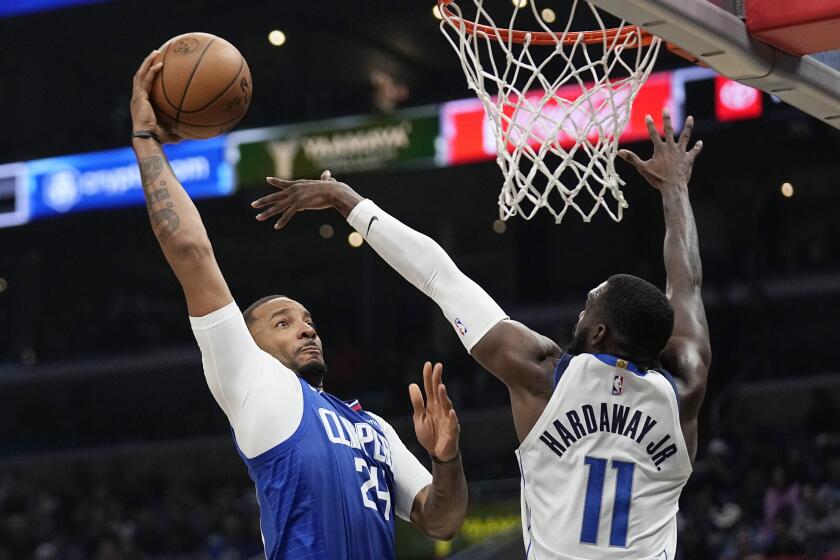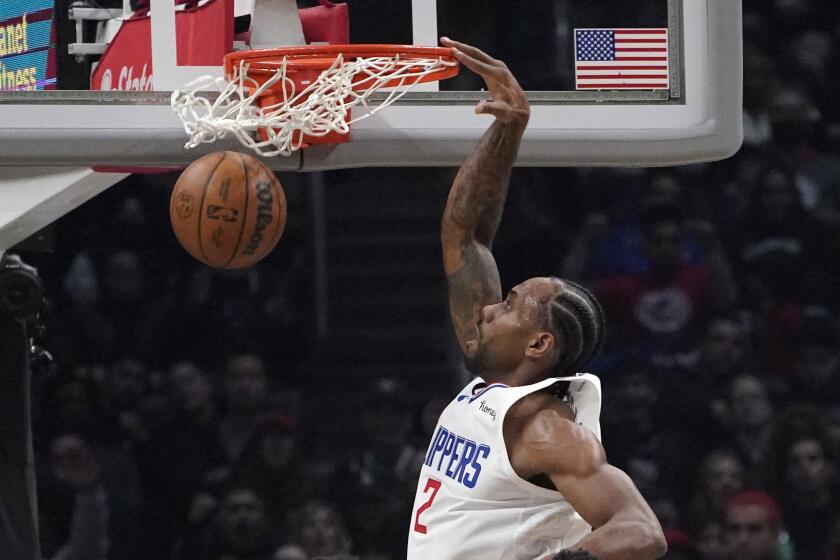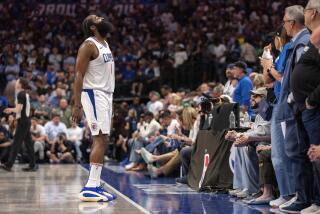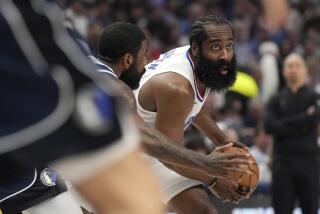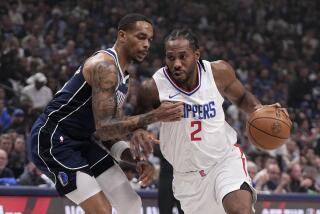Kawhi Leonard is back in full force, but Nuggets continue to own Clippers
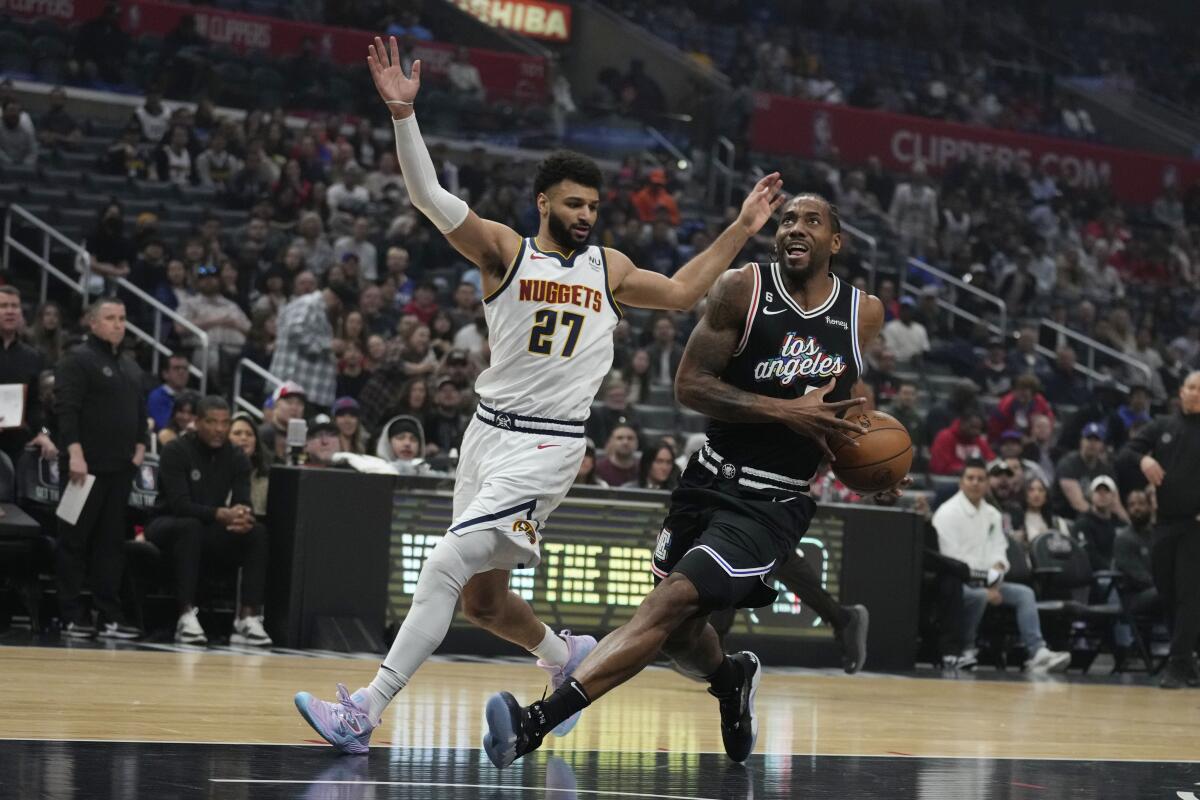
For the last month, Kawhi Leonard’s ability to dictate pace was back. His shooting has picked up. His playmaking had garnered notice. The last question about his recovery from a 2021 knee injury, for NBA insiders, was whether or when his explosiveness would return.
That box was emphatically checked Friday night as Leonard, after dribbling into the paint at a crouch to escape the reach of Denver’s Bones Hyland, planted his left sneaker outside the restricted area of the paint and dunked on Nuggets center Zeke Nnaji — a moment so quick and powerful it appeared as though out of a time machine from the 2021 postseason.
Not answered Friday was the other question asked by NBA insiders.
The Clippers have seen dividends from a change in coach Tyronn Lue’s rotation. They have regained some of their defensive stinginess. The last piece? Whether, or when, they can put it all together against the league’s best teams — now or in the postseason.
Kawhi Leonard scored a season-high 33 points, and the Clippers ended a six-game losing streak with a 113-101 home victory over the Dallas Mavericks.
They could not against Denver at Crypto.com Arena in a 115-103 loss that leaves the Clippers 22-22 despite Leonard’s 24 points, Norm Powell’s 18, and Marcus Morris Sr. and John Wall each adding 16.
Denver “has owned us,” Lue acknowledged before tipoff, and his team fell to 2-8 against the Nuggets since 2021. But the Clippers’ struggles against the league’s upper crust aren’t limited to this Mile High matchup. Friday’s loss left the Clippers 5-13 against teams with .500-or-better records, and for context, within the top 10 of the Western Conference standings that comprises the field of the play-in tournament, every other team has at least eight wins against such competition, and five have at least 10.
How much such a record matters lies in the eye of the basketball beholder. But for a team that entered the season with championship goals, there is this history: In the last 20 seasons, only three teams that finished with losing records against teams with .500-or-better records advanced to the NBA Finals: Miami in 2006 (19-21) and Cleveland in 2017 (22-25) and 2018 (22-23). Just one ultimately won the championship: Miami.
Over those same 20 seasons, NBA finalists averaged a .619 winning percentage against teams with .500-or-better records. The lesson seems clear: The best teams typically sharpen themselves by regularly beating other good teams.
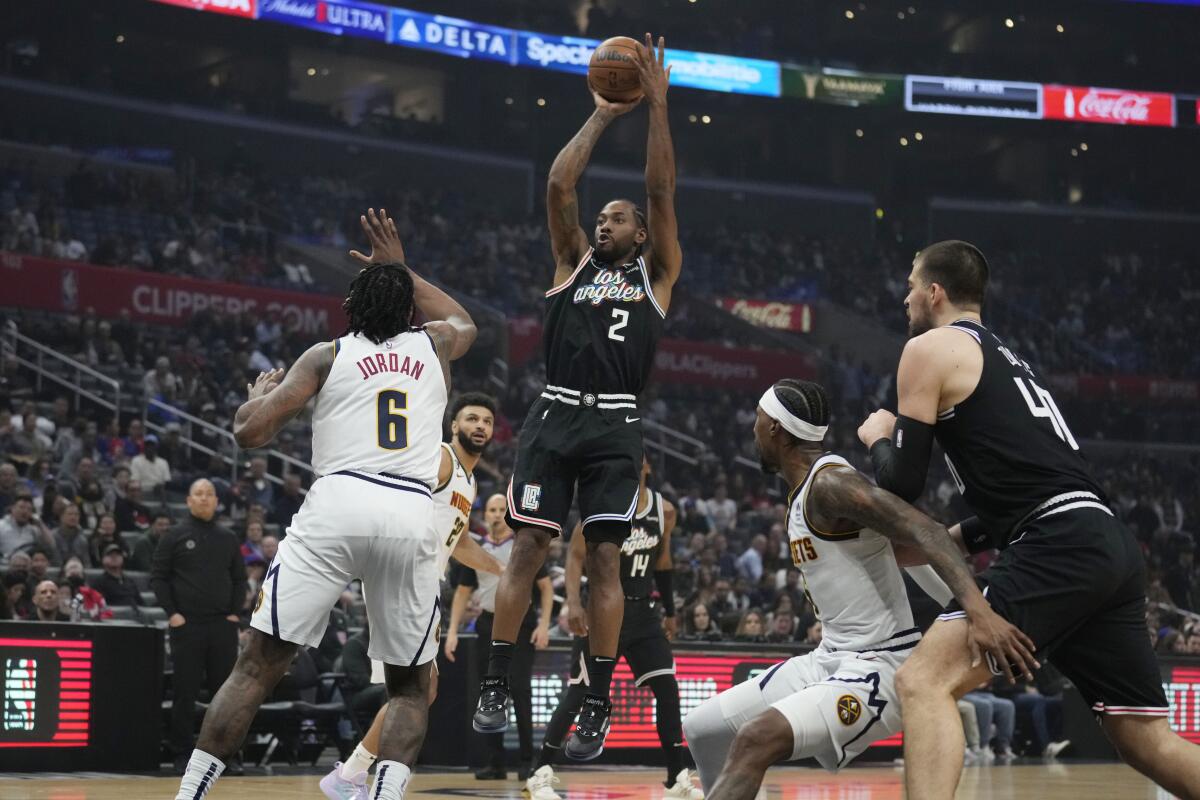
“You beat teams that are ranked higher than you or teams that … have a better record than you, it definitely fuels the team,” said Clippers wing Terance Mann, who started at point guard for a third consecutive game versus Denver and had eight points and four assists.
Yet if that two-decade track record establishes a profile of what a top team should look like, Lue doesn’t consider it a hard-and-fast rule — because he has his own track record.
Lue coached the 2017 and 2018 Cavaliers. In 2016, he became the only coach to win a title after falling behind three games to one in an NBA Finals. This is the same coach who unwinds by playing craps at the Vegas tables and cards at the team hotel. He coached the Clippers in 2021 to their deepest postseason run in franchise history after a ho-hum 21-17 record against winning teams. He views unfavorable odds as a challenge to be defied.
It’s a reminder that teams evolve, that the postseason is a “different beast,” as Lue said, and that Lue would prefer not to show his full hand before the postseason.
Nicolas Batum, Kawhi Leonard and others spoke about how to endure a season that has produced a six-game losing streak, the Clippers’ longest since November 2017.
Yet this season’s record has been primarily a function of how rarely their best players have been healthy enough to play. Missing Paul George (hamstring) for a fourth consecutive game and Luke Kennard (calf) for a third in a row, the Clippers lacked the offensive firepower to respond.
That scarcity is why games with a moderate-to-full-strength roster against the league’s upper crust have carried a bit more weight, and why their victories in those matchups have been often described as rare breakthroughs in a difficult season.
“I think you want to win every game, but when you get big wins like the Cleveland win, the Boston win, those do feel good and kind of let you know where you are at,” Lue said.
It explains why Lue was keenly interested in his team’s performances against Denver. On Jan. 5 in Denver, both teams were at virtually full strength, but after a 31-point blowout loss, Lue dubbed the teams’ rematch Friday “a game where we see what we’re made of.”

With less than a month remaining until the trade deadline, the Clippers still appear to be made of largely disparate parts struggling to find their place.
Clinging to slight leads after the first and second quarters, the Clippers’ old weakness, turnovers, derailed a second half despite a wrist injury sidelining Nuggets center Nikola Jokic, a two-time NBA most valuable player.
Denver forward Aaron Gordon, whom Lue also described as owning the Clippers before tipoff, finished with 17 points, while Jamal Murray scored 24.
More to Read
Get our high school sports newsletter
Prep Rally is devoted to the SoCal high school sports experience, bringing you scores, stories and a behind-the-scenes look at what makes prep sports so popular.
You may occasionally receive promotional content from the Los Angeles Times.

